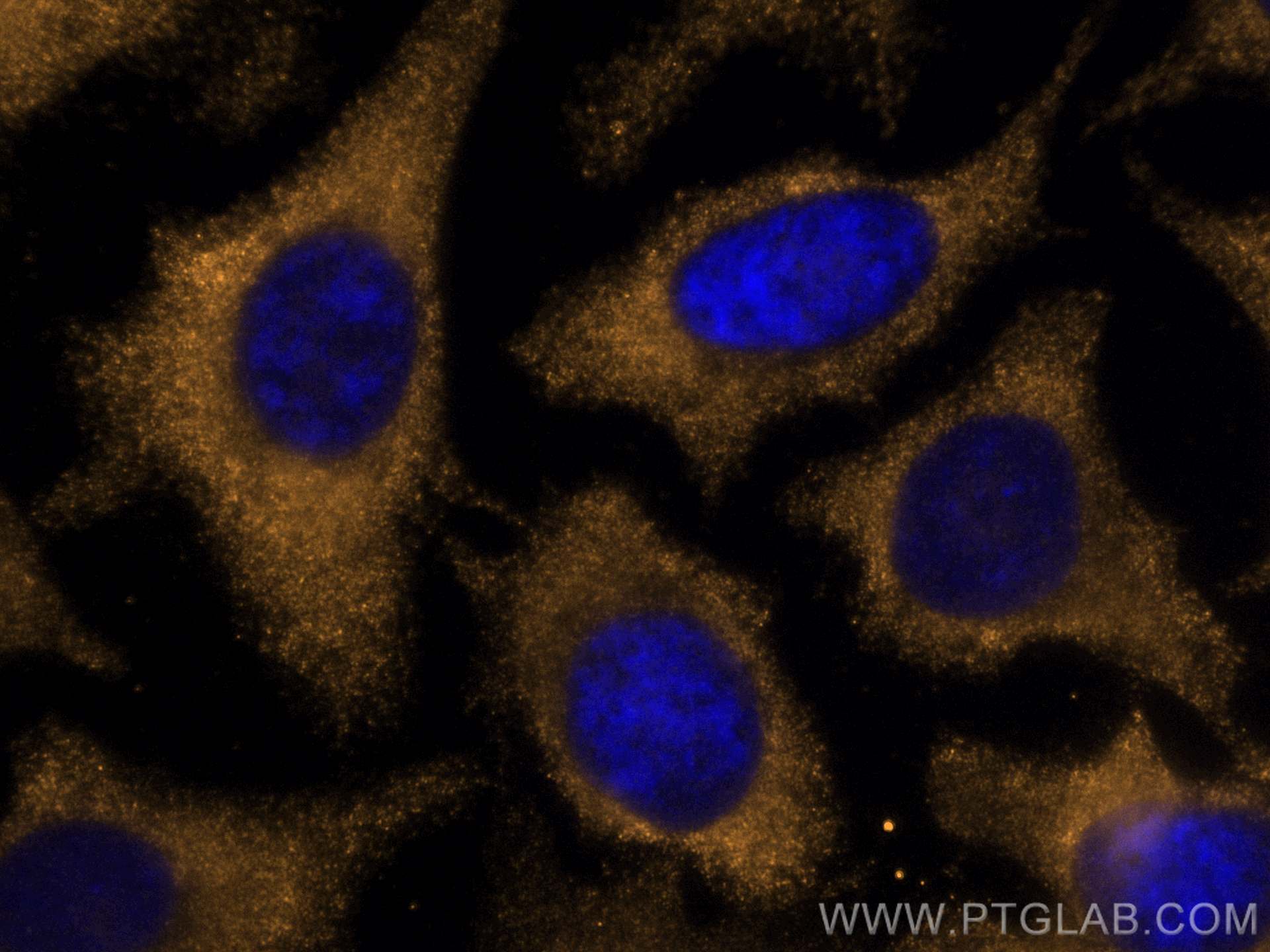Tested Applications
| Positive IF/ICC detected in | HeLa cells |
Recommended dilution
| Application | Dilution |
|---|---|
| Immunofluorescence (IF)/ICC | IF/ICC : 1:50-1:500 |
| It is recommended that this reagent should be titrated in each testing system to obtain optimal results. | |
| Sample-dependent, Check data in validation data gallery. | |
Product Information
CL555-66862 targets PCK1 in IF/ICC applications and shows reactivity with mouse, rat, pig, human samples.
| Tested Reactivity | mouse, rat, pig, human |
| Host / Isotype | Mouse / IgG1 |
| Class | Monoclonal |
| Type | Antibody |
| Immunogen |
CatNo: Ag9720 Product name: Recombinant human PCK1 protein Source: e coli.-derived, PET28a Tag: 6*His Domain: 274-622 aa of BC023978 Sequence: EGEKKYLAAAFPSACGKTNLAMMNPSLPGWKVECVGDDIAWMKFDAQGHLRAINPENGFFGVAPGTSVKTNPNAIKTIQKNTIFTNVAETSDGGVYWEGIDEPLASGVTITSWKNKEWSSEDGEPCAHPNSRFCTPASQCPIIDAAWESPEGVPIEGIIFGGRRPAGVPLVYEALSWQHGVFVGAAMRSEATAAAEHKGKIIMHDPFAMRPFFGYNFGKYLAHWLSMAQHPAAKLPKIFHVNWFRKDKEGKFLWPGFGENSRVLEWMFNRIDGKASTKLTPIGYIPKEDALNLKGLGHINMMELFSISKEFWEKEVEDIEKYLEDQVNADLPCEIEREILALKQRISQM Predict reactive species |
| Full Name | phosphoenolpyruvate carboxykinase 1 (soluble) |
| Calculated Molecular Weight | 622 aa, 69 kDa |
| Observed Molecular Weight | 65-69 kDa |
| GenBank Accession Number | BC023978 |
| Gene Symbol | PCK1 |
| Gene ID (NCBI) | 5105 |
| RRID | AB_2934681 |
| Conjugate | CoraLite®555 Fluorescent Dye |
| Excitation/Emission Maxima Wavelengths | 557 nm / 570nm |
| Form | Liquid |
| Purification Method | Protein G purification |
| UNIPROT ID | P35558 |
| Storage Buffer | PBS with 50% glycerol, 0.05% Proclin300, 0.5% BSA, pH 7.3. |
| Storage Conditions | Store at -20°C. Avoid exposure to light. Stable for one year after shipment. Aliquoting is unnecessary for -20oC storage. |
Background Information
PCK1(Phosphoenolpyruvate carboxykinase, cytosolic) is also named as PEPCK1 and belongs to the phosphoenolpyruvate carboxykinase [GTP] family. It catalyzes the formation of phosphoenolpyruvate from oxaloacetate, with the release of carbon dioxide and GDP. It is also a main control point for the regulation of gluconeogenesis. In eukaryotes there are two isozymes: a cytoplasmic one and a mitochondrial one. Defects in PCK1 are the cause of cytosolic phosphoenolpyruvate carboxykinase deficiency (C-PEPCKD).
Protocols
| Product Specific Protocols | |
|---|---|
| IF protocol for CL555 PCK1 antibody CL555-66862 | Download protocol |
| Standard Protocols | |
|---|---|
| Click here to view our Standard Protocols |




